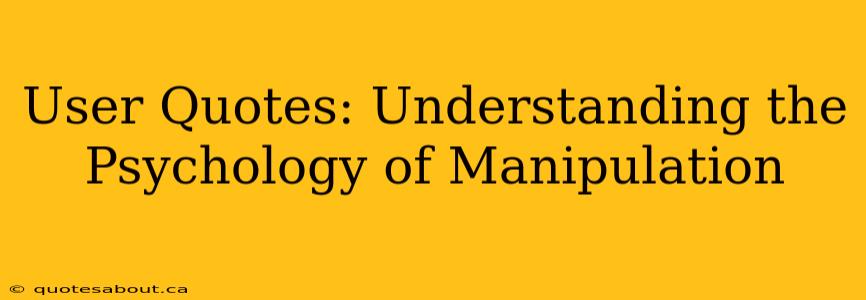In the digital age, understanding user quotes isn't just about analyzing words; it's about deciphering the underlying psychology. User quotes, whether positive or negative, offer a powerful window into the motivations, emotions, and experiences shaping user behavior. This understanding is crucial for businesses, marketers, and anyone seeking to improve user experience and build stronger relationships. This article delves into the psychology behind user quotes, exploring how they reveal manipulation tactics and providing insights into how to interpret and leverage this information ethically.
What are User Quotes and Why are they Important?
User quotes, often found in reviews, testimonials, social media comments, and survey responses, are verbatim statements expressing users' opinions and experiences. They are invaluable because they provide direct, unfiltered feedback. Unlike aggregated data, which provides a broad overview, user quotes offer rich qualitative insights, showcasing the nuances of user sentiment. Analyzing these quotes allows us to understand not just what users are saying, but why they are saying it, often revealing hidden motivations and subconscious biases.
How User Quotes Reveal Manipulation Tactics
Manipulative language, whether intentional or unintentional, often subtly influences user perception. Analyzing user quotes can uncover these subtle manipulations:
- Emotional appeals: Quotes that heavily rely on emotional language (e.g., "I was so angry!", "I felt completely betrayed!") reveal attempts to evoke strong feelings, potentially swaying opinions without presenting factual evidence.
- Leading questions: If user quotes consistently echo specific phrasing or concerns, it suggests that the way information was presented might have influenced their responses. This can be intentional (e.g., loaded survey questions) or unintentional (e.g., biased reporting).
- False dichotomies: Quotes presenting limited options ("either this or that") can manipulate users into choosing a predetermined outcome. This tactic restricts perspectives and limits critical evaluation.
- Bandwagon effect: Quotes emphasizing widespread agreement ("everyone is saying…") attempt to leverage social pressure to influence individual opinions. This undermines independent thought and critical assessment.
- Authority bias: Quotes citing experts or authorities without providing context or substantiation can mislead users. This plays on the inherent human tendency to trust those perceived as knowledgeable.
How to Ethically Interpret User Quotes
Interpreting user quotes requires careful consideration:
- Context is key: Always analyze quotes within their broader context, considering the platform, the user's background, and the circumstances surrounding their statement.
- Avoid confirmation bias: Be wary of selectively choosing quotes that support pre-existing beliefs. A balanced perspective considering both positive and negative feedback is essential.
- Identify underlying motivations: Try to understand the reasons behind user statements. What needs are they expressing? What experiences are shaping their opinions?
- Look beyond the words: Pay attention to the tone, style, and emotional undercurrents in the quotes. These often reveal more than the literal meaning of the words themselves.
- Respect user privacy: Always handle user quotes responsibly, respecting their privacy and avoiding the misuse of personal information.
What are the different types of user quotes?
User quotes can be categorized in various ways, depending on the context and the goal of the analysis. Some common types include:
- Positive feedback: These quotes express satisfaction and praise, offering insights into what aspects of a product or service resonate with users.
- Negative feedback: These quotes highlight areas for improvement, identifying problems and pain points.
- Neutral feedback: These quotes express neither strong positive nor negative sentiment, offering balanced perspectives.
- Quotes reflecting specific features: These quotes focus on particular aspects of a product or service, providing detailed feedback on individual components.
- Quotes reflecting overall experience: These quotes provide a holistic view of the user's interaction with a product or service.
How can I use user quotes to improve my product or service?
User quotes are a powerful tool for product development and improvement. By systematically analyzing user feedback, businesses can:
- Identify areas for improvement: Negative quotes highlight shortcomings that need addressing.
- Refine existing features: User quotes offer valuable insights into how features can be enhanced or redesigned.
- Develop new features: Quotes suggesting unmet needs can inspire the creation of new features or products.
- Improve marketing and communication: Positive quotes can be incorporated into marketing materials to build trust and credibility.
- Enhance customer service: Understanding user frustrations through their quotes improves customer service strategies.
Conclusion
Understanding the psychology behind user quotes offers a powerful approach to analyzing user feedback and improving user experience. By interpreting quotes ethically and carefully, businesses can glean invaluable insights into user motivations, identify manipulation tactics, and build stronger, more authentic relationships with their audience. Remember, the goal is not simply to collect data, but to understand the human experience reflected in those words.

